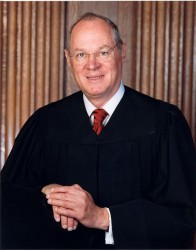U.S. Supreme Court Justice Anthony Kennedy, who has written all of the court’s decisions striking down discrimination against homosexuals, is poised for a prominent place in history if a same-sex marriage case makes it to the high court, says a Vanderbilt law professor.

“One thing is certain,” says Mark E. Brandon, professor of law at Vanderbilt Law School and author of the new book States of Union: Family and Change in the American Constitutional Order.“Justice Kennedy holds the key to the resolution of the same-sex marriage issue in the Supreme Court.”
Kennedy has usually been the court’s swing vote on such issues.
“If (Kennedy) were to write a decision that broadly strikes down states’ prohibitions of same-sex marriage, he will have achieved a place in the history not only of the court, but of the nation,” Brandon said.
In States of Union, Brandon challenges proponents of “family values” who trace many of their arguments to Supreme Court decisions of the 1920s. Instead, he shows how concepts of the family were changing long before then, in particular during the end of the 19th century as a response to Mormon polygamy, communal experiments and Native American households during the settling of the West.
“For example,” Brandon writes in States of Union, [lquote]“same-sex households – some covert, some not – appeared with surprising frequency in the old West.[/lquote] Even within nuclear heterosexual households, formal marriage wasn’t always required.”
In Indian tribes of the period, sexual mores were more permissive than European-American
norms and a divorce was easily obtained. There were also families formed under the institution of slavery, despite inhibitions built into that system making it difficult.
“The Supreme Court since the 1960s has imposed limits on states’ authority to restrict access to marriage,” Brandon said. “In U.S. v. Windsor (2013), the court embraced three principles that lend credence to the same-sex marriage argument.”

Those are defining marriage as a relationship of special “status and dignity,” protected even for same-sex couples; banning government from denying access to that relationship because of a “bare desire to harm a politically unpopular group”; and a directive that the court give “careful consideration” whether any restrictive policy violates the Constitution.
States of Union: Family and Change in the American Constitutional Order is published by University Press of Kansas.